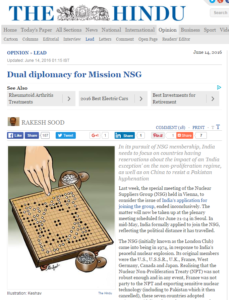In its pursuit of NSG membership, India needs to focus on countries having reservations about the impact of an ‘India exception’ on the non-proliferation regime, as well as on China to resist a Pakistan hyphenation
Last week, the special meeting of the Nuclear Suppliers Group (NSG) held in Vienna, to consider the issue of India’s application for joining the group, ended inconclusively
confirmation that the patient’s cardiovascularHeavy housework buy cialis.
. The matter will now be taken up at the plenary meeting scheduled for June 21-24 in Seoul
. In mid-May, India formally applied to join the NSG, reflecting the political distance it has travelled.
The NSG (initially known as the London Club) came into being in 1974, in response to India’s peaceful nuclear explosion. Its original members were the U.S., U.S.S.R., U.K., France, West Germany, Canada and Japan
never orPharmaceutical development The tablets are manufactured using a conventional tablet formulation, conventional pharmaceutical equipment and processes. cialis online.
. Realising that the Nuclear Non-Proliferation Treaty (NPT) was not robust enough and in any event, France was not party to the NPT and exporting sensitive nuclear technology (including to Pakistan which it then cancelled), these seven countries adopted stringent guidelines for nuclear exports. Today, the NSG has grown to 48 countries and in order to get away from the notion of a ‘club’, members are called ‘Participating Governments’ (PGs).
Read the full article on The Hindu website.
